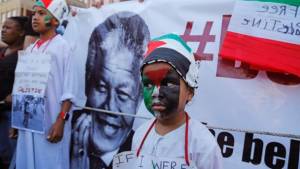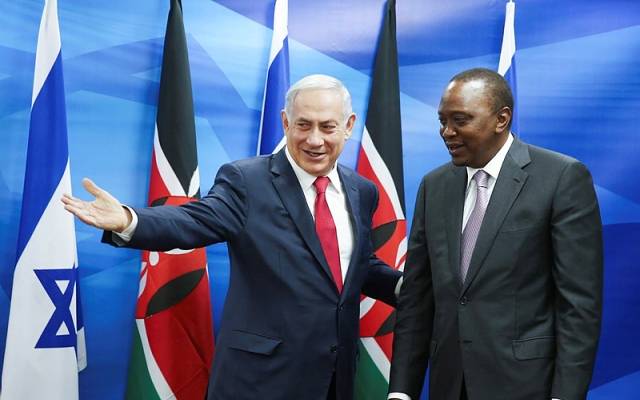The story of Israel’s cooperation program with Africa from 1958 to 1973 is known by no one outside of Israel today, as Israeli Apartheid Week sweeps the world’s campuses and as Israel is being falsely accused of racism at every turn.
Last week, Kenyan President Uhuru Kenyatta visited Israel and signed a cooperation agreement regarding water, irrigation and agriculture with Prime Minister Benjamin Netanyahu. Kenyatta was accompanied by Kenyan Foreign Minister Amina Mohamed.
Israel “has more friends than not on the continent,” Mohamed told The Jerusalem Post. “I was counting the countries, and maybe 40 out of 54 African countries see Israel as a very close friend.”
She emphasized that friendship is not only about the political realm — Africa habitually votes as a bloc against Israel in international forums, such as the UN — but that it is important to look at the economic realm as well, including all the Israeli companies working on the African continent. For Israel, inevitably, this also means cooperation within the field of security for which the Kenyan foreign minister expressed her appreciation. “We supported each other through a lot of challenges and difficulties, and we have cooperated in many areas, including in security and this whole process of fighting and combating terrorism in our part of the world,” she said, referring to the Somalia-based al-Qaida affiliate al-Shabab. ”We have been collaborating, we have been learning from you,” she said, adding that Israel has helped with “capacity building, operational equipment, with sharing from your experience and learning from what you have done.”
Speaking of Kenya’s voting against Israel in international forums, she said, “In many cases it is very difficult to break the African bloc.”
”It is very rare. We actually have been quite courageous in breaking away sometime.” One way of working to break these voting patterns, said Mohamed, is by engaging with as many Africans as possible, including having high-level visits. One such visit will happen in the summer, when Netanyahu will be visiting Kenya, as well as Uganda.
”High-level visits bring their own wind with them,” Mohamed said. “They enhance their relationship, they make it clear to everybody, send a very clear signal that these two countries agree to cooperate on the highest level, speak the same language, and deal with issues in the same manner. It is an affirmation that this is a strong relationship.”
Unlike Europeans, Israelis Lived Among the Africans
Israel did indeed cultivate a strong relationship with Africa from the earliest beginnings, when the newly decolonized African nations emerged, sending thousands of Israeli experts in agriculture, hydrology, regional planning, public health, engineering, community services, medicine and scores of other fields throughout Africa between 1958 and 1973. Thousands of Africans trained in Israel during the same time. (So much for Israeli “apartheid.”) Unlike Europeans, the Israelis lived among the Africans they came to assist on the African continent, not in their own, segregated compounds. (Again, so much for Israeli ”apartheid.”)

“We did what we did in Africa …was a continuation of our own most valued traditions and an expression of our own deepest historic instincts,” late Prime Minister Golda Meir (pictured) said in her memoirs. (AP Photo)
Former Prime Minister Golda Meir wrote in her 1975 memoirs, “My Life,” that “at least some of the impetus for my initial involvement with Africa…came as an emotional response to the situation in which we found ourselves after the Sinai Campaign — in many respects entirely alone, less than popular and certainly misunderstood. France was an ally and a good friend, and one or two other European countries were sympathetic to us; but our relationship with the United States was strained, and in Asia … we had for the most part come up against a stone wall.
”Still, the world was not made up exclusively of Europeans and Asians. There were also the emerging nations of Africa.… Like them, we had shaken off foreign rule; like them, we had had to learn how to reclaim the land, how to increase the yields of our crops… We couldn’t offer Africa money or arms, but on the other hand we were free of the taint of the colonial exploiters because all that we wanted from Africa was friendship. Let me at once anticipate the cynics. Did we go into Africa because we wanted votes at the United Nations? Yes, of course that was one of our motives — and a perfectly honorable one — which I never … concealed either from myself or from the Africans. But it was far from being the most important motive. … The main reason for our African ‘adventure’ was that we had something we wanted to pass on to nations that were even younger and less experienced than ourselves.”

A child stands next to a picture of Nelson Mandela at a protest against “Israeli Apartheid” on Aug. 9, 2014, in Cape Town. (AP)
The votes in the UN did not materialize, despite Israel’s heavy involvement on the African continent, but Meir had no regrets when the African nations, “for the time being,” as she said in her memoirs, turned their backs on Israel at the UN and elsewhere. “We did what we did in Africa not because it was just a policy of enlightened self-interest… but because it was a continuation of our own most valued traditions and an expression of our own deepest historic instincts.” For Meir, the aid to the people of Africa typified “the drive toward social justice, reconstruction and rehabilitation that is at the very heart of Labor Zionism — and Judaism.” Not that all those who took part in the program were socialists, as Meir goes on to say.
The story of Israel’s cooperation program with Africa from 1958 to 1973 is known by no one outside of Israel today, as Israeli Apartheid Week sweeps the world’s campuses and as Israel is being falsely accused of racism at every turn. As a sitting Israeli prime minister is about to visit sub-Saharan Africa for the first time since Yitzhak Shamir did so in 1987 — and as an era of strong and mutual cooperation between Israel and the African nations hopefully materializes, hopefully also in places such as the UN — it is worth remembering Meir’s words regarding one tragic, yet strong, bond between Africans and Jews:
”We shared with the Africans not only the challenge posed by the need for rapid development, but also the memory of centuries of suffering. Oppression, discrimination, slavery — these are not just catchwords for Jews or for Africans. They refer not to experiences undergone hundreds of years ago by half-forgotten ancestors, but to torment and degradation experienced only yesterday.”
This article was first published by Israel Hayom.
